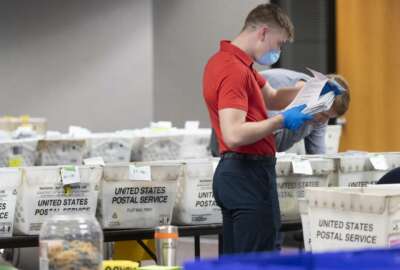

Postmaster General Louis Dejoy is facing tough questions from lawmakers less than a week after he agreed to postpone operational changes.
Best listening experience is on Chrome, Firefox or Safari. Subscribe to Federal Drive’s daily audio interviews on Apple Podcasts or PodcastOne.
Postmaster General Louis Dejoy is expected to face tough questions from a House committee today. Less than a week after he agreed to postpone a series of USPS operational changes until after the election, Democrats in particular still want answers about steps that have been taken so far that still could lead to mail delays. Mitchell Miller is the Capitol Hill correspondent for our sister station, WTOP. He joined Federal Drive with Tom Temin to talk more about today’s testimony.
Interview transcript:
Jared Serbu: Mitchell, this will obviously be the Postmaster General’s second appearance on Capitol Hill within just a few days timeframe. What sorts of issues is he likely to face in the House hearing today that weren’t satisfied in in Friday’s hearing in the Senate?
Mitchell Miller: Well, I think we’re going to tread over some of the ground that was covered in that Friday hearing. The House Oversight Committee does bring back Louis DeJoy before Congress to answer more of these tough questions related to mail in voting and a host of other issues. This hearing is likely to be less friendly than the one that was held by the Senate Homeland Security Committee last Friday, which is chaired by Republican Senator Ron Johnson. Though DeJoy certainly dealt with a lot of pointed questions during that hearing, he’s a longtime republican fundraiser with no experience with the Postal Service, as Democrats have repeatedly pointed out, and he maintains that the Postal Service will be able to handle the surge in mail and votes and that there’s been nothing done to slow down service. But there are still a lot of questions, as you mentioned, about, for example, why was the mail processing equipment taken out at various postal facilities, including some here in the Washington area? That question really hasn’t been answered. DeJoy did answer one question related to that saying that it would not be put back that equipment that’s actually been taken out. So I think there’s going to be some follow up on that because many Democratic lawmakers are skeptical about why the equipment was taken out if it was just supposed to be part of the normal role of things at the Postal Service. So I think we’re going to get it a lot more nitty gritty questions too, about mail-in voting. House Democrats really concerned about this. There were some questions Friday, also at the hearing in the Senate related to delays in medicine, delays in equipment for businesses that people need. So lawmakers are also trying to take it a little bit beyond what’s only in the election universe, if you will. They’re talking about these are really basic questions for people about whether or not they get the medicine that they need in a timely fashion. But I think that probably overall this hearing is going to be more politically oriented. House Democrats really, really want to press DeJoy on a lot of these issues and continue to ask questions about whether or not there’s any kind of influence at all from the Trump administration. He has said there is not.
Jared Serbu: The sequencing here is kind of interesting. I mean, the House took up legislation this past weekend, dealing mostly with the Postal Service’s economic issues, I think. Does the fact that they’re now going into an oversight hearing also on USPS suggest that they may want to take a second bite at the apple as far as legislation goes?
Mitchell Miller: It may indicate that. I think basically it’s all about politics as it usually is in Washington. The Friday hearing was actually scheduled a while back. So it’s kind of interesting that the House action over the weekend was sandwiched in between these two hearings. The House Oversight Committee hearing, that came about because you just had this Firestorm going along from Democrats at least pushing for more answers. Republicans have said that there were a lot of things that were already in the works even before Louis DeJoy took over as the Postmaster General earlier in the summer. So it’s interesting. I think that the political push for this hearing was really starting to move in the last few weeks. And then Democrats just decided with House Speaker Pelosi deciding to have this rare session on Saturday to bring them all back in. I think that the Democrats just feel they have a really hot political issue. And let’s not be too cynical, either. They really want to make sure that constituents are getting what they need, and there have been a lot of Republicans that have raised questions too. Post offices in rural areas, in states that are red, are also affected by this if there are delays as well. So there have been members of both sides. But I do think again, it’s as usual politics is driving this.
Jared Serbu: Looking beyond just USPS, are there still any kind of reasonable prospects for passage of a bipartisan bill, bicameral bill to deal with coronavirus issues extending beyond USPS?
Mitchell Miller: It’s really going to be a tough road because there continues to be a lot of talk about getting additional legislation that goes beyond the Postal Service legislation. But it still appears congressional Democrats and Republicans and the White House are still talking past each other. Enhanced unemployment benefits through the President’s Executive Order are slowly moving ahead and may go out in the coming weeks. But Democrats say there’s still not enough, and many other issues still haven’t been resolved over funding for schools. The paycheck protection program for small businesses, many say that still needs to be shoren up. And of course testing related to COVID-19. Democrats and Republicans are also still very far apart on funding for state and local governments. Democrats continue to insist that they want close to a trillion dollars on that alone, while Republicans entire legislation is about a trillion dollars. So it looks like it’s going to take a long time before this is going to really come together. There’s been a lot of discussion about a so called skinny bill, but aside from the Postal Service legislation, there really hasn’t been a lot of movement to get something together on that.
Jared Serbu: Before we let you go one issue, also dealing with coronavirus, has been concerned by employee unions representing federal employees over the past week, AFGE in particular, expressing concerns about sending employees back to work prematurely. I know they’re also doing some work on Capitol Hill on that front and how is that playing?
Mitchell Miller: Right. Well, there was the survey that came out from AFGE of their federal employees and nearly 80% of them, eight in ten, say that they are feeling unsafe About the return to work. And we’ve been talking over the last several weeks about what agencies are actually doing to make sure that people do feel safe if they have to go back to work physically. And a lot of the lawmakers, especially many in the Washington area, since we have so many federal workers here have really raised a lot of concerns about that. Senator Chris Van Hollen of Maryland, has been one of the most vocal related to that saying he just doesn’t think that there’s been enough related to telework. He wants agencies to do more to keep people in the loop about when they’re going to come back. There’s also been some questions about the guidelines at various agencies and whether or not they’re actually being closely followed to make sure that people, when they do come back, they do feel safe. So I think this is going to be a continuing issue. There was some thought earlier in the year that maybe by this fall, a lot of these issues would be resolved, that the coronavirus would be down on a lower level. Certainly we’ve had improvement here, especially in the infection rate in Maryland has really gone down, but there still remain a lot of concerns as this poll pointed out. Something like 73% of the people who were surveyed with AFGE say they don’t believe their agency is taking enough precautions to keep them safe. So that’s a real big issue here for federal workers.
Jared Serbu: WTOP’s Mitchell Miller joining us from Capitol Hill. Thanks so much.
Mitchell Miller: You bet.
Copyright © 2025 Federal News Network. All rights reserved. This website is not intended for users located within the European Economic Area.
Tom Temin is host of the Federal Drive and has been providing insight on federal technology and management issues for more than 30 years.
Follow @tteminWFED


